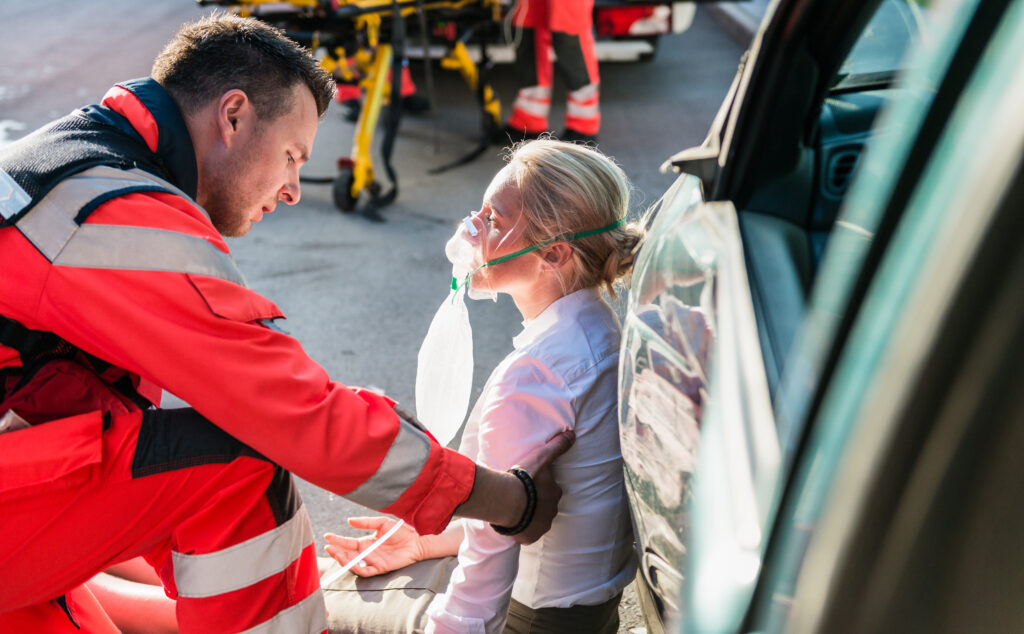Injuries From Auto Accidents
Car accident injuries occur due to the sudden and forceful impact between vehicles, which can cause the human body to move in unnatural and harmful ways. Car crashes can result in occupants being thrown against the interior elements of the car, such as the steering wheel, dashboard, or windows, leading to various injuries. The severity of these injuries depends on factors like the speed at the time of the accident, the use of seatbelts, the direction of impact, and the presence of airbags.
The severity of car accident injuries can also vary from moderate to severe. If you have suffered a car accident injury, it is important for an injured person to seek medical treatment immediately. Additionally, consult with a skilled car accident lawyer at PhillyLaw to find out whether you may be entitled to compensation for your car accident injury. We will always give you a free consultation on your case.

Common Car Accident Injuries
Common car accident injuries include whiplash, fractures, traumatic brain injuries, and lacerations. You can suffer arm and leg injuries, knee injuries, head injuries, face and eye injuries, chest injuries, neck injuries, or broken ribs as a result of a car accident. Additionally, psychological impacts can arise, manifesting as anxiety or PTSD in the aftermath of the incident.
Severe Car Accident Injuries
Despite the prevalence of minor injuries, car accidents can also result in serious injuries that necessitate extensive medical treatment and can leave lasting effects on the individuals involved.
Brain and Head Injuries
Brain and head injuries are among the most serious car accident injuries. These neurological injuries can range from mild concussions to severe traumatic brain injury (TBI), which can have long-term and sometimes permanent effects on a victim’s life. The force of a car accident can cause the head to strike objects like the steering wheel, dashboard, or windows, leading to cuts, bruises, tinnitus, or more severe internal damage.
Even without direct impact, the rapid acceleration and deceleration of the car can cause the brain to move violently within the skull, potentially leading to bruising, bleeding, or tearing of brain tissue. Symptoms of brain and head injuries can include headaches, confusion, memory loss, dizziness, and changes in personality or behavior. Given the complexity and potential severity of these head injuries, immediate and comprehensive medical evaluation is critical to diagnose and begin proper treatment.
Broken Bones
Broken bones in a car accident typically result from the harsh and abrupt forces exerted during the collision. The immense pressure from the impact can crush or bend parts of the body against hard surfaces inside the vehicle, such as the steering wheel, dashboard, or door panels. Occupants might also suffer fractures from being thrown against seat belts or if a limb is caught between pieces of the vehicle’s collapsing structure.
Furthermore, in more severe car crashes, occupants can be ejected from the vehicle entirely, leading to breaks upon impact with the ground or other objects. The nature and severity of the broken bones can vary greatly depending on the specific dynamics of the accident, including the speed at impact, the point of collision on the vehicle, and whether the occupants were wearing seatbelts properly.
Back and Spinal Cord Injuries
Back and spinal cord injuries are among the most severe outcomes of car accidents, with the potential to drastically alter a person’s life. These injuries occur when the force of a collision causes damage to the vertebrae, ligaments, or disks of the spinal column, or to the spinal cord itself. The impact can result in anything from minor back strains and sprains, which cause pain and limit mobility, to more serious conditions such as fractures, herniated discs, or even spinal cord damage that can lead to partial or complete paralysis.
The location and severity of the injury along the spinal cord greatly influence the extent of the impairment, with injuries closer to the neck typically having more widespread effects on bodily function. Recovery from such injuries can be a long and challenging process, requiring extensive medical treatment, rehabilitation, and in many cases, adjustments to lifestyle and living spaces to accommodate mobility limitations.
Internal Injuries and Chest Injuries
Internal injuries and chest injuries sustained from car accidents are among the most dangerous and life-threatening outcomes due to their propensity to go unnoticed immediately following the incident. These serious injuries occur when the force of the impact causes damage to the internal organs and internal bleeding.
Common types of internal injuries from a car accident include:
- Chest injuries leading to pneumothorax (collapsed lung),
- Ruptured spleen,
- Liver lacerations,
- Kidney damage, and
- Internal bleeding in areas such as the chest, abdomen, or pelvis.
Unlike external injuries that are visible and can be quickly diagnosed, internal injuries might not exhibit symptoms immediately, making it crucial for individuals involved in a car accident to receive a thorough medical examination even if no injuries are apparent. The severity of internal injuries can escalate rapidly without prompt medical attention, potentially leading to life-threatening situations that require immediate surgical intervention. Such serious injuries not only impact the physical well-being of those involved but can also have profound emotional and financial implications.

Minor Car Accident Injuries
While some car accident injuries are severe and life-altering, many individuals experience more minor injuries that, though less catastrophic, still require attention and care.
Lacerations and Bruises
Lacerations and bruises from car accidents are typically caused by objects or debris inside the vehicle becoming projectiles upon impact. Sharp edges from broken glass, metal fragments, airbags, or even personal belongings can result in penetrating injuries like cuts and lacerations, while blunt force trauma from hitting the steering wheel, dashboard, or seatbelts can cause bruising.
The intensity of these injuries varies depending on the nature of the crash, with high-speed collisions often leading to more severe harm. Ensuring safety measures like properly wearing seatbelts and keeping loose items secured can mitigate the severity of these injuries from car accidents.
Soft Tissue Injury
Soft tissue injuries in car accidents occur when the body undergoes sudden and forceful movements, causing strain, stretching, or tearing of muscles, ligaments, and tendons. These injuries often result from the abrupt deceleration and acceleration of the body during a collision, leading to conditions such as whiplash, a common car accident injury, where the neck and spine are rapidly thrust forward and then backward.
Even with seatbelts, which are critical for preventing more severe injuries, the body can still experience significant jolts that lead to soft tissue injuries. Due to adrenaline and shock, such injuries might not be immediately apparent after a car accident, making it essential for individuals involved in a car accident to seek medical attention, even if they feel fine initially.
Although these car accident injuries are usually not critical, they can still cause significant discomfort and inconvenience to the individuals involved. Prompt medical evaluation is advised as some minor injuries can lead to more serious conditions if not treated properly.
Additional Injuries
Beyond the immediate physical injuries, car accidents can lead to additional neurological and psychological injuries, affecting individuals’ lives in profound and sometimes lasting ways.
Additional Neurological Injuries
Neurological injuries following a car accident encompass a range of conditions that affect the nervous system, including the brain, spinal cord, and peripheral nerves. These injuries can result in a variety of symptoms and long-term effects, depending on their severity and location.
- Nerve Damage: Peripheral nerve injuries can result when trauma from the accident causes cuts, compression, or stretching of nerves, leading to symptoms such as numbness, pain, and weakness in the affected areas.
- Neurological Disorders Post-Trauma: In some cases, individuals may develop neurological conditions following an accident, such as post-traumatic epilepsy, which involves recurring seizures triggered by the initial brain injury.
Recovery from neurological injuries due to a car accident varies significantly among patients, often requiring a multidisciplinary approach involving neurologists, physical therapists, and counselors to address the wide range of potential physical and psychological effects.
Psychological Injuries
The psychological impact of car accidents is as significant as physical injuries, with victims often experiencing conditions such as Post-Traumatic Stress Disorder (PTSD), anxiety, depression, and phobias associated with driving or vehicles. The emotional trauma from a car accident can disrupt daily functioning, relationships, and professional life, requiring mental health support and therapy to heal. Acknowledging and treating these psychological injuries are vital steps in the comprehensive recovery from a car accident, emphasizing the need for a holistic approach to post-accident care that addresses both the body and the mind.

Steps to Take When You Are Injured in a Car Crash
If you are injured in a car crash, it is crucial to prioritize your health and legal rights from the outset.
Seek Medical Attention
First and foremost, seek medical attention immediately, even if your injuries seem minor. Some injuries, particularly internal ones, may not manifest symptoms right away but can be life-threatening if not treated promptly. Documenting your injuries through a medical professional also serves as vital evidence should you need to file an insurance claim or a lawsuit.
Report the Accident
Next, report the accident to the police and obtain a copy of the accident report, as it will be important documentation for insurance and legal purposes. If possible, take photographs of the scene, your vehicle, the other vehicle(s) involved, and any visible injuries. These can be instrumental in supporting your account of the event.
Contact Your Insurance Company
Contact your insurance company to report the accident and make a car accident claim but be cautious about providing statements or accepting settlements without consulting a lawyer. Insurance companies often aim to minimize payouts, and an early settlement may not fully cover your medical expenses, damage to your vehicle, or compensation for pain and suffering.
Consult with a Car Accident Lawyer
Consider consulting with an attorney experienced in personal injury and car accident cases. The skilled legal team at PhillyLaw can offer advice on your case, help you understand your rights, and represent you in negotiations with insurance companies or in court, if necessary.
Continue Medical Treatment As Necessary
Finally, follow through with all recommended medical treatments and keep detailed records of your medical appointments, treatments, and expenses related to the accident. Maintaining a diary of how your injuries have impacted your daily life and well-being can also be helpful. Through taking these steps, you can safeguard your health and ensure you’re positioned as strongly as possible to receive the compensation you deserve.

Types of Car Accidents
Car accidents can occur under a variety of circumstances and can be classified into several types based on the manner in which they happen. Understanding these types can help in grasping the potential risks and the nature of injuries they commonly cause.
- Rear-End Collisions: Often resulting from one vehicle hitting the back of another, rear-end collisions are among the most common types of car accidents. These usually happen due to sudden stops, reduced traction due to wet or icy roads, or distracted driving. Injuries commonly associated with rear-end collisions include whiplash, spinal cord injuries, and head injuries.
- Head-On Collisions: These occur when the front ends of two vehicles collide. Head-on collisions are particularly dangerous and are more likely to result in fatal or serious injuries due to the high force of impact. Common causes include driving on the wrong side of the road or swerving into oncoming traffic to avoid obstacles.
- Side-Impact Collisions: Also known as T-bone or broadside collisions, these happen when the side of one vehicle is hit by the front or rear of another vehicle. This type of accident is commonly associated with intersections and can cause serious injuries due to the limited protection offered by the sides of a vehicle.
- Rollovers: A rollover occurs when a vehicle flips over onto its side or roof. This type of accident can happen with any vehicle but is more common in SUVs and pickup trucks due to their higher center of gravity. Rollovers can be triggered by sharp turns, high speeds, or collisions with other vehicles or objects.
- Single Vehicle Accidents: These accidents involve only one vehicle and can include crashing into a stationary object, running off the road, or rolling over. Factors such as driver distraction, intoxication, and poor road conditions often contribute to single-vehicle accidents.
- Multi-Vehicle Pile-Ups: These involve multiple vehicles and are more likely to occur on highways and freeways where vehicles are traveling at higher speeds. Pile-ups can result from a chain reaction where one collision triggers another, often significantly complicating rescue efforts and increasing the likelihood of severe injuries.
Each type of car accident has unique characteristics and poses different risks to the occupants of the vehicles involved. Understanding these types is crucial for analyzing accident causes, determining liability, and developing strategies for accident prevention and safety enhancements.
The Various Types of Damages Resulting from a Motor Vehicle Accident
Damages stemming from a motor vehicle accident within the context of a personal injury claim can be categorized into several types, reflecting the range of losses and impacts experienced by the victim. These include:
Economic Damages:
Often referred to as special damages, these cover the tangible, out-of-pocket expenses directly related to the accident. They include medical expenses for emergency care, ongoing treatment, rehabilitation, and medication. Economic damages also cover lost wages if the injuries prevent the victim from working, and the cost to repair or replace damaged property, including the vehicle involved in the crash.
Non-Economic Damages:
These are also known as general damages and encompass intangible losses that don’t have a specific dollar amount attached. Pain and suffering is the most recognized form of non-economic damages, accounting for the physical discomfort and emotional distress caused by the accident. Other non-economic damages include loss of consortium, which refers to the negative impact on the relationships with a spouse or close family members, and emotional distress, encompassing anxiety, depression, and other psychological effects stemming from the accident.
Punitive Damages:
While not awarded in every case, punitive damages serve a dual purpose. They punish the defendant for particularly reckless or negligent behavior leading to the accident and deter similar conduct in the future. Punitive damages are not directly related to the victim’s losses but are instead aimed at penalizing wrongful behavior.
Understanding these categories is crucial for victims of car accidents as they prepare to file a personal injury claim. Each type of damage contributes to the overall compensation sought, capturing the full extent of the victim’s physical, emotional, and financial hardships caused by the accident.
Our Commitment to Helping You Receive Compensation for Car Accident Injuries
Understanding the traumatic experience of car accidents is crucial, as they are not only physically damaging but can also leave lasting emotional scars. The sudden, harrowing event can leave individuals feeling vulnerable, shocked, and uncertain about their next steps. Recognizing this, the team at PhillyLaw offers compassionate and comprehensive legal assistance tailored to the needs of those affected by car accidents. Armed with expertise and empathy, they work tirelessly to alleviate the burden on accident victims, ensuring they receive the support and compensation necessary for a full recovery from their car accident injuries. If you have been injured in a Philadelphia car accident, call the legal team at PhillyLaw for a free consultation.






